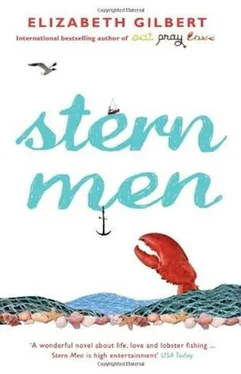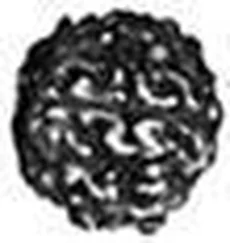“You can rub his hands. They say it’s good to keep them from getting too twisted, poor little guy.”
Ruth poured some lotion into her palm and started to rub one of Ricky’s hands. Immediately, she felt a movement in her stomach, a building wave like seasickness. Such an atrophied, lifeless little hand!
Ruth was once fishing with her father when he pulled up a trap with a molting lobster. It was not unusual, in the summertime, to find lobsters with new, soft shells only days old, but this lobster had probably molted an hour or so before. Its perfect and empty shell lay beside it in the trap, useless now, hollow armor. Ruth had held the naked lobster in her palm, and handling it had given her the same seasickness she now experienced in handling her brother. A lobster with no shell was boneless meat; when Ruth picked it up, the limp lobster hung on her hand, offering no more resistance than a wet sock. It hung there like something melting, as if it would eventually drip from her fingers. It was nothing like a normal lobster, nothing like one of those snappy fierce little tanks. And yet she could feel its life in her hand, its blood whirring in her palm. Its flesh was a bluish jelly, like a raw scallop. She had shuddered. Just by handling it, she had begun to kill it, leaving her fingerprints on its thin-skinned organs. She had flung it over the side of the boat and watched it sink, translucent. It didn’t have chance. It didn’t have a chance in the world. Something probably ate it before it even touched bottom.
“There,” said Ruth’s mother. “That’s good of you.”
“Poor little guy,” Ruth made herself say, working the lotion into her brother’s strange fingers, his wrist, his forearm. Her voice sounded strained, but her mother seemed not to notice. “Poor little guy.”
“Did you know that when your father was a little boy in the Fort Niles school, back in the forties, the teachers taught the children to tie knots? That was an important part of the curriculum on the island. And they were taught how to read tidal charts, too. In school! Can you imagine?”
“It was probably a good idea,” Ruth said. “It makes sense for island kids to know those things. Especially back then. They were going to be fishermen, right?”
“But in school, Ruth? Couldn’t they first teach the children to read and leave the knots till the afternoon?”
“I’m sure they learned to read, too.”
“That’s why we wanted to send you to private school.”
“Dad didn’t want it.”
“I meant the Ellises and I. I’m very proud of you, Ruth. I’m proud of how well you did. Eleventh in the class! And I’m proud that you learned French. Will you say something in French for me?”
Ruth laughed.
“What?” her mother asked. “What’s funny?”
“Nothing. It’s just that whenever I speak French around Angus Addams, he says, ‘What? Your what hurts?’ ”
“Oh, Ruth.” She sounded sad. “I’d hoped you would speak some French to me.”
“It’s not worth it, Mom. I have a stupid accent.”
“Well. Whatever you want, honey.”
They were quiet for a spell, and then Ruth’s mother said, “Your father probably wished you’d stayed on the island and learned to tie knots!”
“I’m sure that’s exactly what he wished,” Ruth said.
“And tides! I’m sure he wanted you to learn tides. I could never learn them, though I tried. Your father tried to teach me how to operate a boat. Driving the boat was easy, but somehow I was supposed to know where all the rocks and ledges were, and which ones popped up during which tides. They had practically no buoys out there, and the ones they had were always drifting off course, and your father would yell at me if I tried to navigate according to them. He didn’t trust the buoys, but how was I to know? And currents! I thought you were supposed to point the boat and pull the throttle. I didn’t know anything about currents!”
“How could you know?”
“How could I know, Ruth? I thought I knew about island life, because I’d spent my summers there, but I didn’t know a thing. I had no idea about how bad the wind gets in the winter. Did you know that some people lost their minds from it?”
“I think most people on Fort Niles did,” Ruth said and laughed.
“It doesn’t stop! My first winter there, the wind started blowing at the end of October and didn’t die down until April. I had the strangest dreams that winter, Ruth. I kept dreaming that the island was about to blow away. The trees on the island had long, long roots that reached right down to the ocean floor, and they were the only thing keeping the island from drifting away in the wind.”
“Were you scared?”
“I was terrified.”
“Wasn’t anybody nice to you?”
“Yes. Mrs. Pommeroy was nice to me.”
There was a knock at the door, and Ruth’s mother started. Ricky started, too, and began flipping his head back and forth. He screeched; it was a terrible sound, like the screech of an old car’s bad brakes.
“Shhh,” his mother said. “Shhh.”
Ruth opened the nursery door, and there stood Cal Cooley.
“Catching up?” he asked. He came in and bent his tall frame into a rocking chair. He smiled at Mary but did not look at Ricky.
“Miss Vera wants to go for a drive,” he said.
“Oh!” Mary exclaimed, and jumped to her feet. “I’ll fetch the nurse. We’ll get our coats. Ruth, go get your coat.”
“She wants to go shopping,” Cal said, still smiling, but looking at Ruth now. “She heard that Ruth arrived with no luggage.”
“And how did she hear that, Cal?” Ruth asked.
“Beats me. All I know is she wants to buy you some new clothes, Ruth.”
“I don’t need anything.”
“Told you so,” he said, with the greatest satisfaction. “I told you to bring your own clothes or Miss Vera would end up buying you new things and pissing you off.”
“Look, I don’t care,” Ruth said. “Whatever you people feel like making me do, I don’t care. I do not give a shit. Just get it over with.”
“Ruth!” exclaimed Mary, but Ruth didn’t care. The hell with all of them. Cal Cooley didn’t seem to care, either. He just shrugged.
They drove to the dress shop in the old two-tone Buick. It took Mary and Cal nearly an hour to get Miss Vera dressed and bundled up and down the stairs to the car, where she sat in the front passenger seat with her beaded purse on her lap. She had not been out of the house for several months, Mary said.
Miss Vera was so small; she was like a bird perched in the front seat. Her hands were tiny, and she trembled her thin fingers lightly across her beaded purse, as though reading Braille or praying with an endless rosary. She had lace gloves with her, which she set beside her on the seat. Whenever Cal Cooley turned a corner, she would put her left hand on the gloves, as though she were afraid they would slide away. She gasped at every turn, although Cal was driving at approximately the speed of a healthy pedestrian. Miss Vera wore a long mink coat and a hat with a black veil. Her voice was very quiet, with a slight waver. She smiled when she spoke, pronounced her words with a trace of a British accent, and delivered her every line wistfully.
“Oh, to go on a drive…” she said.
“Yes,” agreed Ruth’s mother.
“Do you know how to drive, Ruth?”
“I do,” said Ruth.
“Oh, how clever of you. I was never proficient, myself. I would always collide …” The memory set Miss Vera to tittering. She put her hand to her mouth, as shy girls do. Ruth had not remembered Miss Vera to be a giggler. It must have come with age, a late affectation. Ruth looked at the old woman and thought about how, back on Fort Niles Island, Miss Vera made the local men working on her yard drink from the garden hose. She wouldn’t allow them into the kitchen for a glass of water. Not on the hottest day. That practice of hers was so hated that it gave rise to an expression on the island: Drinking out of the hose. It indicated the lowest depth of insult. My wife got the house and the kids, too. That bitch really left me drinking out of the hose.
Читать дальше









